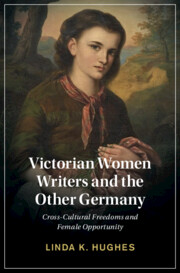Book contents
- Victorian Women Writers and the Other Germany
- Cambridge Studies in Nineteenth-Century Literature and Culture
- Victorian Women Writers and the Other Germany
- Copyright page
- Dedication
- Epigraph
- Contents
- Figures
- Acknowledgements
- Preface/Vorwort
- Introduction
- Chapter 1 Entrée to the ‘Other’ Germany
- Chapter 2 Germany through a Female Lens
- Chapter 3 Networked Families in Germany
- Chapter 4 An Unbeliever in Germany
- Chapter 5 The Anglo–German Fiction of George Eliot and Jessie Fothergill
- Chapter 6 New Woman Travellers and Translators
- Chapter 7 An Anglo–German Expatriate–Citizen
- Chapter 8 Queer Borders
- Nachwort/Afterword
- Notes
- Bibliography
- Index
- Cambridge Studies in Nineteenth-Century Literature and Culture
Chapter 5 - The Anglo–German Fiction of George Eliot and Jessie Fothergill
Daniel Deronda (1876) and The First Violin (1878)
Published online by Cambridge University Press: 02 June 2022
- Victorian Women Writers and the Other Germany
- Cambridge Studies in Nineteenth-Century Literature and Culture
- Victorian Women Writers and the Other Germany
- Copyright page
- Dedication
- Epigraph
- Contents
- Figures
- Acknowledgements
- Preface/Vorwort
- Introduction
- Chapter 1 Entrée to the ‘Other’ Germany
- Chapter 2 Germany through a Female Lens
- Chapter 3 Networked Families in Germany
- Chapter 4 An Unbeliever in Germany
- Chapter 5 The Anglo–German Fiction of George Eliot and Jessie Fothergill
- Chapter 6 New Woman Travellers and Translators
- Chapter 7 An Anglo–German Expatriate–Citizen
- Chapter 8 Queer Borders
- Nachwort/Afterword
- Notes
- Bibliography
- Index
- Cambridge Studies in Nineteenth-Century Literature and Culture
Summary
This chapter reads the canonical novel Daniel Deronda, by George Eliot, and lesser-known novel The First Violin, by Jessie Fothergill, in conversation with each other and with the fiction of German-Jewish author Paul Heyse, to which a single episode of Eliot’s may be indebted, while Fothergill draws on Heyse’s 1873 Kinder der Welt throughout in plot, structure, and gendered characters. Both British novels feature dual narrators and plots and exemplify Anglo–German exchange, especially in relation to opera and German music. But whereas Gwendolyn Harleth fails at a music career and marriage, Fothergill’s first five of six books comprise a New Woman plot of a single woman refusing mercenary marriage to pursue a career: protagonist and English narrator May Wedderburn studies music abroad, with the talent and drive to succeed, and lives alone. The sixth book, however, modulates from a New Woman story to heterosexual romance and marriage. Complicating this outcome are Fothergill’s dual plot and her second, male German narrator, the romantic friend of the novel’s protagonist, the German concertmaster whom May loves. The novel thus mixes heterosexual romance, queer masculinity, and queer romance, giving male love the last word and qualifying conventional Victorian happy endings.
- Type
- Chapter
- Information
- Victorian Women Writers and the Other GermanyCross-Cultural Freedoms and Female Opportunity, pp. 107 - 128Publisher: Cambridge University PressPrint publication year: 2022



